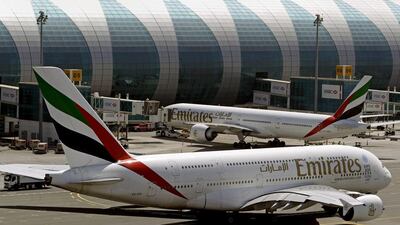Emirates is cutting fares on US routes in a move likely to stoke fresh tensions with American rivals.
It comes just two days after Emirates announced it would start a new daily service from Dubai to Newark Liberty International Airport via the Greek capital of Athens.
That announcement drew swift criticism from the US airlines group that has been lobbying against the expansion of regional carriers in the US.
“By flagrantly violating its Open Skies agreement with the United States at the start of the Trump administration, Emirates is throwing down the gauntlet,” Jill Zuckman, a spokeswoman for the Partnership for Open & Fair Skies, told Bloomberg. “We look forward to working with president Trump and his team to enforce these agreements and protect American jobs – something that the Obama administration failed to do.”
Emirates and other regional carriers have been embroiled in a long-running feud with their US rivals who accuse them of benefiting from unfair state subsidies – a claim that the Arabian Gulf carriers have denied.
Emirates said on Wednesday that it would offer special fares across 12 US destinations with economy return fares starting from Dh3,560 to New York and Dh3,660 to Fort Lauderdale.
Emirates operates 17 daily flights to the US and has partnerships with Alaskan Airlines and JetBlue.
The Emirates route between Dubai and Newark is only the second service through Europe that the Dubai carrier operates. The other is between Milan and JFK airport.
The global aviation industry is watching closely for signs of how the Trump administration will handle the feud.
While the America First trade agenda of the new president presents a potential new platform for the aggrieved trio of United, American and Delta, regional airlines also spend billions of dollars on planes from Boeing and other US manufacturers.
"What transpires will depend on what view is formed concerning the criticisms put forward by the US big three carriers and how these are weighed against the consumer and economic benefits to US cities of direct services operated by the Gulf carriers," John Strickland, director at JLS Consulting, told The National last month. "Along with this will be consideration of the massive export value of aircraft orders by the Gulf carriers and the jobs that these support."
In a speech to the Aviation Club of the UK last month, the Emirates president Tim Clark said that aviation was at an inflection point.
“Our industry has done well in the past years on the wings of global trade and liberalisation, which are key catalysts for global aviation growth. However, all that is at risk of getting derailed by protectionism and inward-looking policies.”
scronin@thenational.ae
Follow The National's Business section on Twitter

